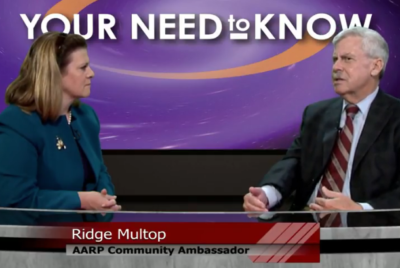Medicare with Ridge Multop of AARP
(Oct. 3, 2018) Catherine Read sits down with Ridge Multop, community ambassador with AARP, to discuss information regarding the Medicare program. October through December is open enrollment season, and it is important for seniors to understand the ins and outs of the system before committing to a plan.
President Lyndon Johnson signed Medicare into law 53 years ago. At the time the country was facing a healthcare crisis. Many seniors were living longer than ever before, and were unable to secure medical coverage from private insurers, due to their age or their preexisting conditions. The Medicare system was established as a safety net in order to provide hospital and outpatient care to all Americans over the age of 65. This original program is known as Medicare parts A and B.
Establishing Medicare was a huge undertaking, and critical to providing a safety net to seniors in America. Legislators recognized, however, that there were gaps in coverage. Therefore, they established Medicare Part C plans (also known as Medicare Advantage plans) as an option for seniors. These plans are sold by private insurers, and are designed to complement Medicare parts A and B. These are supplemental plans that seniors can purchase for additional monthly payments. More recently, Medicare Part D was created in the early 2000’s. This program specifically targeted the rising cost of prescription drugs, in an effort to make medications more affordable for the elderly. Multop points out that there are still certain benefits that are not covered through Medicare, including vision, hearing and dental care.

Multop shares that today, 75% of the funding for Medicare comes out of the general treasury fund, combined with the payments from the monthly premiums. If the President and Congress fail to come up with a funding formula that will sustain the program, than the result will be premium increases.
In the most recent AARP Bulletin, Multop note that there are three critical questions that voters need to ask their Congressional candidates before heading to the polls this November:
- Do you believe that Medicare should be cut to reduce the deficit? (follow-up question can be should Social Security be cut to reduce the deficit?)
- Do you prefer converting Medicare to a voucher program?
- What changes would you make to ensure that people will continue to get the promised Medicare benefits that they have earned?
Lastly, Multop wants people to know that Medicare recently sent out new cards to all members in April through June of 2018. The old cards contained social security numbers, which put people at risk of identity theft. If you did not receive a new card, contact your local office to get a replacement. He also shares that Medicare will never ask you for a social security number anymore. If you encounter someone requesting this information, it is most likely a fraudulent scam. Should you need help or assistance with understanding Medicare or Medicaid benefits, he encourages people to reach out to the Virginia Insurance Counseling Assistance Program (VICAP). They are available to work with Virginia residents to help understand the various benefits and programs.